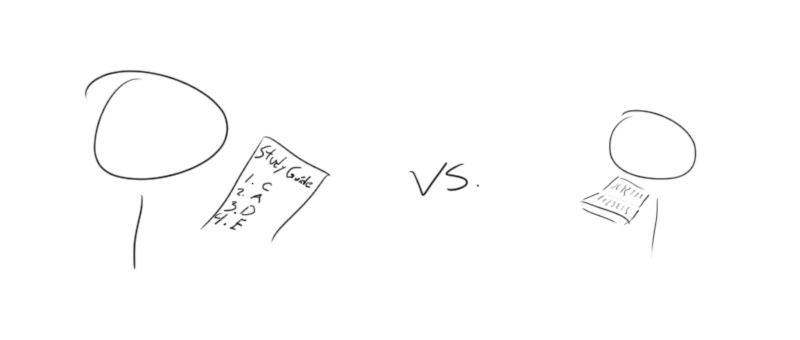One of the blogs I follow shared an article about why using textbooks and tests is doomed for failure. The thing that stuck out to me -- amidst the discussion of education funding, resource management, and needing kids to succeed in school -- was this simple observation: The only way to score well on a standardized test is to study the material directly from the test-maker's textbook. As my bloggy friend said, "The entire world has completely lost its mind."
Why is this so bad?
Forget indoctrination, bias, agendas, and lay aside your fear of political manipulation and social engineering by "the powers that be." Temporarily ignore your concerns that corporations, in bed with the government, are making gobs of money selling schools inferior materials that are detrimental to your child's future success. The real danger I see is this: We've made education a knowledge set rather than a lifestyle.
I enjoy a good conspiracy theory, but I don't think this was intentional. The accidental nature almost makes it worse. The simplistic version of story I see is this:
- America wants its citizens to be successful and believes that education is the way to that goal.
- Education becomes compulsory.
- Number-crunchers are concerned with our results on international tests (perhaps wrongly).
- Edutheorists and politicians want positive change and believe standardization does that.
- The government awards corporations contracts to use public funds to produce these standardized materials.
- These corporations use their own materials as the basis for textbooks and tests (likely driven by IP restrictions).
- We end up with a bland, muted, "single voice" textbook approach that highlights the keywords kids need to know.
- The tests are based solely on that information, even if inaccurate or unhelpful, in a bid to show positive results.
See, no one was trying to make education about the specific knowledge set of a test. It merely happened as people further and further removed from the learning environment got involved and were put in charge of things. And then, due to interesting forces, these materials turned ever inward on themselves until "correct" is now defined by exactly what they tell you, rather than messy, pesky things like reality, common sense, or definitions.
I've blogged before about how tests can quickly become about your mind-reading ability. And if, as the article points out, you can't list oil and gas as natural resources because they aren't on the teacher-provided list -- taken from the textbook -- the test becomes impossible because you don't have the proper study guide/cheat sheet.
[Aside: After reading a fascinating article on the difference between US and UK grading, I want to say this: The problem here is not testing or even standardized tests. I've learned much about the benefits of testing. The problem is that standardized tests are based on the proper regurgitation of specific information only found within approved texts.]
Your education under this model revolves around learning predetermined details. This is the knowledge set that defines your learning experience. You don't need to learn about reality, you must only memorize that the correct answer to question #13 is B. It doesn't even matter if B is factually correct. The system is grading you, and it is an inbred monster fed by a well-meaning public, like those societies that sacrifice their children to appease the vengeful gods.
And we're doing it, in large part, by accident.
We've forgotten what an education is supposed to be.
We've turned the 12 - 20 years of formal learning into the entirety of education. We've let details become the destination; we've lost sight of the end game as we've tried to clean out the muck and balance the social scales.
We, as homeschoolers, have an opportunity to avoid that trap, to walk the other way, and to ask -- and answer! -- the question: What Makes a Great Education? (Yes, the webinar is 1.5 hours long, but it's filled with good stuff from some really smart people; they let me say a few things now and again, too <grin>)
Learning is a lifestyle that is highly informed during formal education. But that's only one small part of life-long learning. We lay a foundation here, learning how to read and search and question and think, and then we go into life ready to keep learning.
How do we do on tests? Pretty well. We may not have the cheat sheets (er ... textbooks) that well-to-do schools have. Instead, we revel in amazing curriculum that helps nurture our desire to learn. Unlike the author of the article, who fears for the success of students from less funded schools, I think homeschoolers will continue to do well on standardized tests even if the current "crony capitalism" continues. Our focus is different. While schools focus on memorizing a specific knowledge set, we will continue to pursue a lifestyle of learning.
~Luke Holzmann
Filmmaker, Writer, Pseudo-Dad
P.S. I also recommend my post Education Is Not About Teaching.





